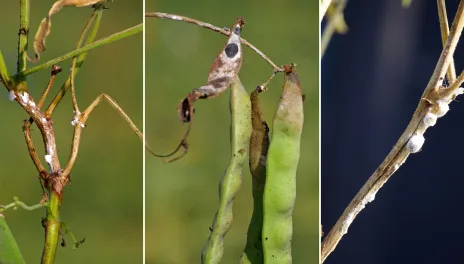Improving white mold management in dry beans – Optimizing fungicide spray volume
Preliminary report from the first three years of a four-year research project. Final results are anticipated after the completion of field trials planned for the 2023 field season.
The impact of fungicide spray volume was tested with a PTO-driven tractor-mounted sprayer equipped with a pulse-width modulation system (Capstan AG; Topeka, KS). Pulse width was modified as needed to achieve the target spray volume while maintaining a constant driving speed and the same nozzles and pressure across all treatments, with pulse width calibrated on the basis of measured output immediately before spraying treatments. Topsin (40 fl oz/ac) was applied at early bloom followed by Endura (8 oz/ac) 11-14 days later. To permit overspray of plots, treatment plots were bordered by 5- or 10-foot wide non-harvested plots. On ends of each treatment plot, a non-harvested plot was established so as to permit turning on and off the sprayer at full driving speed. Dry beans were seeded to rows 14 inches apart at a seeding rate of 90,000 viable seeds/ac (pintos and kidneys) or 100,000 viable seeds/ac (blacks and navies).
|
Table 1. Detailed methods – fungicide spray volume studies |
||||
|
Location and year |
Carrington 2020 |
Carrington 2021 |
Carrington 2022 |
|
|
Applic. #1 |
Driving speed |
6.0 mph |
6.0 mph |
11.5 mph |
|
Droplet size |
Medium |
Medium |
Medium |
|
|
Nozzles, pressure |
XR11006, 35 psi |
XR11006, 35 psi |
XR11006, 35 psi |
|
|
Applic. #2 |
Driving speed |
6.0 mph |
6.0 mph |
8.0 mph |
|
Droplet size |
Medium |
Medium |
Coarse |
|
|
Nozzles, pressure |
XR11006, 35 psi |
XR11006, 35 psi |
XR11010, 30 psi |
|
|
Application interval |
12 days |
14 days |
11 days |
|
|
Plot size |
5 x ave. 10.9 ft |
5 x ave. 16.8 ft |
10 x ave. 17.8 ft |
|
|
Experimental replicates |
13 or 14 |
8 |
8 |
|
Increasing spray volume from 10 to 25 gal/ac had no impact on white mold severity or dry bean yield (Figure 1, all market classes; Figure 2, kidney beans only; Figure 3, pinto beans only). A weak trend of increased yield was observed (1) as spray volume increased from 20 to 25 gal/ac in navy beans in 2020 and dark-red kidney beans in 2021 and (2) as spray volume increased from 15 to 20 gal/ac in pinto beans in 2022, but the differences were not statistically significant and this trend was not observed in the other studies.



The preliminary results from the third year of this four-year project suggest that there may be little or no response to increasing fungicide spray volume from 10 to 25 gal/ac for white mold management in dry beans. Follow-up testing to evaluate the repeatability of these results is planned for the 2023 field season.
Research project funded by the Northarvest Bean Growers Association and the North Dakota Crop Protection Production Harmonization Board and Registration Board.
Michael Wunsch
Michael.Wunsch@ndsu.edu
Plant Pathologist
